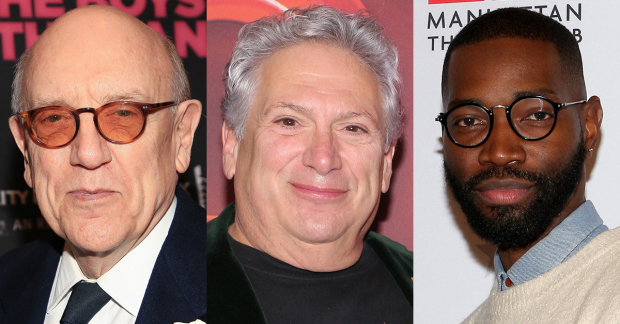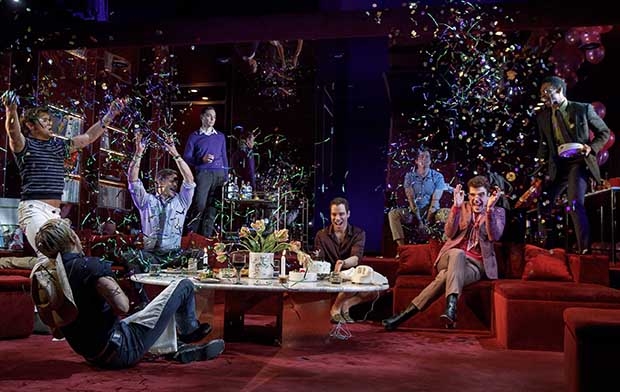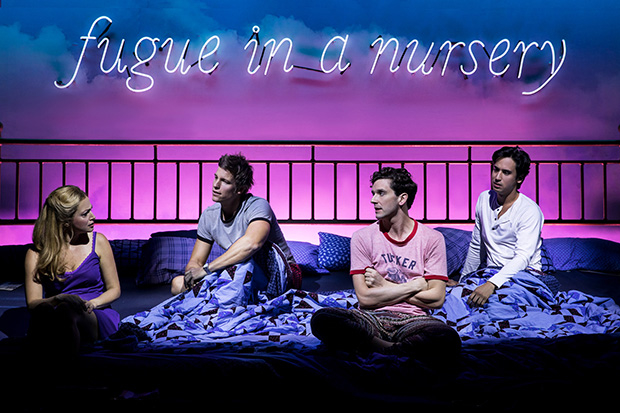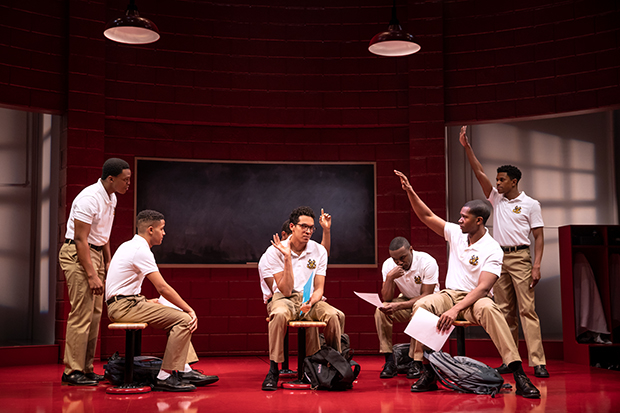Gay Theater Through the Decades: The Boys in the Band, Torch Song, and Choir Boy
Over the course of the 2018-19 season, Broadway documented the evolution of the queer experience across the decades with new productions of Mart Crowley's The Boys in the Band (1968), Harvey Fierstein's Torch Song (1982), and Tarell Alvin McCraney's Choir Boy (2013). In The Boys in the Band, a group of lonely, cynical gay men gather to celebrate a friend's birthday at a party that takes a dark turn. Torch Song follows three different periods in the life of Arnold Beckoff, a man coming to terms with his life as a gay, Jewish New Yorker and his desire to start a family. Choir Boy looks at the struggles of a young, gay black student determined to be himself, even if it means losing his well-earned spot as the choir leader at his elite prep school.
All three plays share something: They document the all-too-human yearning for acceptance in a world that's not very friendly to them. Here, the playwrights of these 2019 Tony-nominated productions discuss where we were when the dramas were first produced, and how far society may or may not have come since.

(© Tricia Baron/David Gordon)
These conversations have been condensed and edited for clarity.
What were you reacting to, culturally, politically, and historically, when you first wrote your respective plays?
Mart Crowley: Mainly desperation. I had come so close to getting things bought or produced, but all attempts failed (or they were made and didn't succeed). I knew that this play I had rolling around in my head was a "taboo" subject (at that time), and the chances of getting it done were slim, but at least, if people read it, it might get their attention. And yes, I was fed up with the way gay people were treated in those days. So I didn't care if people were enraged or outraged.
Harvey Fierstein: I always say that the first act of Torch Song is when you're very immature and it's you against the entire universe. The second act is a bunch of people trying to make believe that they're grown up, but they're just babies, crawling around and hurting each other without meaning to. In the third act, you're no longer creating the world; you are surviving it. The first thing I wrote was the back room scene in International Stud. I was reacting to the reality of having sex in a back room. Widows and Children First, in many ways, was inspired by my landlord, who used to go to Prospect Park to cruise, and he got mugged and beaten up really bad. Somebody smarter than I once said that when you finish writing a play, everything that you know up until that minute is in it. That's sort of it.
Tarell Alvin McCraney: In my community, there are/were always side conversations about the gay choir director or the queer minister of music. We applaud them for their musical gifts but often chastise them for whom they love. In Choir Boy, I wanted to depict that moment when you, a black, queer kid — imagine yourself one if you aren't — learns that you have a gift and try to use that gift to comfort, to help grieve, pray, and celebrate. And then the day comes where your community says, "We love what you do, just not who you are." What do you do?

(© Joan Marcus)
How has the world changed (if you think it has at all) since your plays initially premiered, and what was it like for you to see it onstage again in the light of 2019?
Mart: After The Boys in the Band was originally produced, it was a hit, but then it went through a bad patch of being "politically incorrect." Not the right image to project for the gay community. Thank God, that cloud has passed and the play was a hit again in 2018, 50 years later. That was indescribably fulfilling for me.
Harvey: The world has changed in that we've made it a bit safer here in the United States to be gay. Not completely safe — being yourself is always going to be a dangerous thing — but it's opened up the possibilities. I never wanted to get married, but if a heterosexual has the right to get married, then I should also. Torch Song was criticized by people in the gay movement for that. They'd say, "Who wants to have children? If I wanted children, I'd be heterosexual." That's fine, but there's a difference between not having a choice and not being able to choose. In the United States, there are 30 states where you can still be denied an apartment because you're gay. We're not as far as people think we are.
Tarell: At the time of this interview, there have been four deaths of black transwomen that have made it to the national headlines; who knows how many do not? This year, two young people have attempted suicide after being teased in school for being, or being perceived as, 'gay.' It's terrifying how much of Choir Boy still resonates, and in some cases, is intensified by the lens of our current time.

(© Matthew Murphy)
Where was gay theater when your plays premiered, and how has it evolved in the ensuing decades?
Harvey: A lot of people thought gay theater began with The Boys in the Band, which I absolutely love, but I did three productions of Robert Patrick's The Haunted Host. That was written four years before and doesn't have the negativity that's in a lot of the early gay plays — plays like The Elocution of Benjamin or The Children's Hour, where we really had to look to find ourselves.
Mart: After The Boys in the Band, there were a lot of copycat plays that didn't succeed. Then, great plays came along: Angels in America, Torch Song, Love! Valour! Compassion, As Is. … We need more.
Tarell: There's amazing work happening all around. Jordan E. Cooper, Anthony Wayne, and so many more keep pushing the way we see black queer characters. It's stunning and beautiful.
Where do you think your principal characters would be right now?
Mart: My characters would be very old men in a totally different world, just like me. I wrote a sequel play called The Men From the Boys, but the characters are in their late 50s and early 60s in it. Today, they'd be in their 80s (like me), or they would have passed on.
Harvey: I couldn't possibly answer that — Arnold is a fictional character. I left him in the place that I was comfortable leaving him, and who knows what could have happened?
Tarell: My principal character is nominated for a Tony, or probably won one for his orchestrations of Negro Spirituals.

(© Matthew Murphy)










